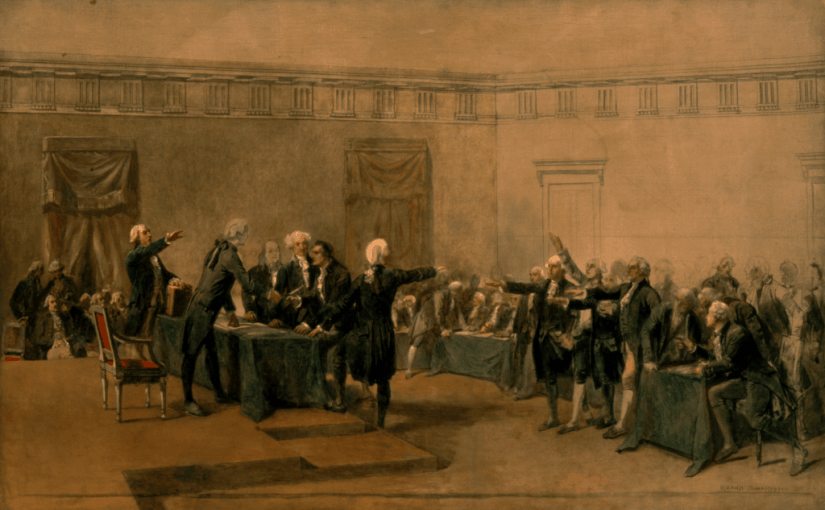Principles of Liberty: Ten Biblical Truths Embedded in the Declaration of Independence
A Five-Session Bible Study
Background Information for Session 1
The Reality and Authority of Nature’s God
This Bible study series is based on the Word Foundations post titled “Principles of Liberty.” The article highlights ten biblical principles embedded in the Declaration of Independence.
The Bible study series consists of five sessions, with each one exploring two principles.
This is the background information for the first session. A teaching plan is available here.
Overview
Talk among the American Colonists about the possibility and even the need to break ties with England had been occurring for some time, but not all the Colonists agreed that ties with the mother country should be severed, or that the time for a formal departure actually had arrived. It was against this backdrop that Richard Henry Lee of Virginia offered a clear and decisive resolution on Friday, June 7, 1776, during the Second Continental Congress. The motion readily was seconded by John Adams. It contained three clauses, the first and most significant of which read,
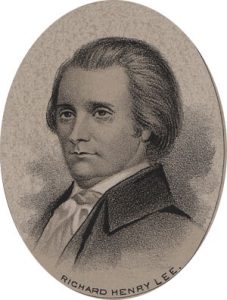
Resolved, That these United Colonies are, and of right ought to be, free and independent States, that they are absolved from all allegiance to the British Crown, and that all political connection between them and the State of Great Britain is, and ought to be, totally dissolved.
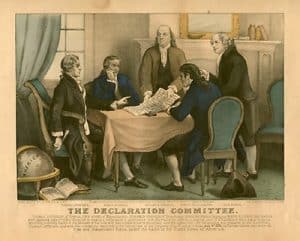
The resolution was tabled until the next day, then discussed over a period of several days. On June 10, the delegates decided they would postpone the vote until July 1. The next day, on June 11, they appointed a “Committee of Five” delegates to draft a declaration and to bring it back before the body. Thomas Jefferson became the principal author of the Declaration. On July 2, the delegates adopted the Richard Henry Lee’s resolution. They then “spent the latter part of July 2, all of July 3, and a portion of July 4 pouring over Jefferson’s draft.”1 The members of the Second Continental Congress made various changes to the draft, even as the Committee of Five had done so earlier. Yet, even with the changes, the document’s primary thrust and themes were not altered. On July 4 the delegates adopted the Declaration itself, but it was not until August 2 that most of them signed it.
According to an article at conservapedia.com,
The Declaration of Independence drew upon Christianity and the Enlightenment English philosopher John Locke. In his famous work “Two Treatises of Government” (1690), Locke declared that all men have the natural (inalienable) rights of “life, liberty and estate (property).” Notably the Declaration of Independence does not emphasize a right to pursue property, however, speaking instead in favor of pursuit of “happiness”.
The Quest to Rediscover the Founders’ Perspective
In this series of studies, we will explore ten Christian elements in the Declaration, ten ideals that are thoroughly biblical but not always recognized as such in our day. In fact, many modern non-Christian influences have so redefined and reinterpreted words and concepts that in some cases, contemporary Americans completely misunderstand what the Founders intended.

A PDF file of the above graphic is available here.
It’s high time we rediscover the true meaning of these ideals and that we contend anew for them as the Founders understood them. In our series, we’re highlighting words and phrases from the most quoted portion of the Declaration; then we’re demonstrating how they’re linked to Scripture and to biblical truth. In this session (the first of five), we’ll be considering the first and second principles.
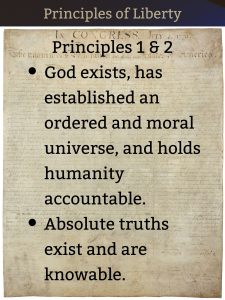
A PDF file of the above graphic is available here.
PRINCIPLE ONE
God exists, has established an ordered and moral universe, and holds humanity accountable.
Jefferson’s draft affirms the efforts of a people “to assume among the powers of the earth the equal & independant station to which the laws of nature & of nature’s god entitle them,” and the final document upholds their efforts “to assume among the powers of the earth, the separate and equal station to which the Laws of Nature and of Nature’s God entitle them.”
The Declaration of Independence upholds the efforts of a people “to assume among the powers of the earth, the separate and equal station to which the Laws of Nature and of Nature’s God entitle them.”
This assumes or presupposes that the people involved are not acting arbitrarily, but in accord with God and His revealed will.
-
-
- We know the Founders believed God existed because they wrote of Him, mentioning Him early, without hesitation, and without embarrassment.
- The term laws indicates they believed God was and is a God of order and purpose.
- The term laws further indicates they believed God had and has moral and ethical expectations of humanity — in other words, that men and women are accountable to Him.
- The phrase “the laws of nature and of nature’s God” indicate that the Founders believed God’s existence was evident in nature, or, put another way, in the world around them.
-
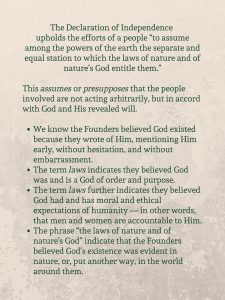
A PDF file of the above graphic is available here.
Let’s consider Scripture and highlight several key points that overlap between the Bible and the Founders’ ideals.
FIRST —The Bible Assumes God’s Existence
The Bible acknowledges God from the start without trying to present intellectual arguments that He exists. Later, as we will see, Scripture does present evidence for God.
Genesis 1:1 states simply and forthrightly, “In the beginning God created the heavens and the earth.”
Likewise, the men who signed the Declaration of Independence also assumed God’s existence. And as we will see, the God they acknowledged is the God the Bible upholds and reveals.
We need to be aware that The first part of Genesis 1:1, “In the beginning God…” has some very profound implications.
The late Dr. Mark Corts and the late James M. Boice make numerous observations about the Bible’s first statement, which is God’s introduction of Himself in His Word. Genesis 1:1 says, “In the beginning God created the heavens and the earth.” This declaration refutes atheism, materialism, polytheism, humanism, relativism, and pantheism. It affirms God’s authority, supremacy, and eternality. God’s immutability—the fact that He does not change and therefore can be trusted to remain as He is—flows from His eternal nature. Genesis 1:1 further testifies that God is self-existent and has no needs. Instead, we need Him! Also, God is the source of all that is. He is both originator and initiator—not of evil, of course, for God is holy and cannot be the source of evil.
Much of what Scripture implies in Genesis 1:1, it reveals more fully on subsequent pages.
SECOND — Nature’s ordered structure points to a God of precision and purpose.
The design of nature itself points to a Designer, but not just any Designer. Nature’s ordered structure points to a God of precision and purpose. Nature is not chaotic but meaningful. It also is balanced; and, in the many instances in which it needs to be precise to sustain life, it is just that.
In his excellent book The Case for a Creator, journalist and atheist-turned-Christian Lee Strobel reports on numerous interviews he had with world-class scholars about evidence for a Creator. One of these scholars was Robin Collins, PhD. Strobel describes Collins as “an articulate, physics-trained philosopher who has done his own original research on the issue [of precision in the universe]. I especially liked his reputation—he was known as being careful and conservative in his calculations, unwilling to make judgments that exceed the bounds of the data.”2 Collins serves as Distinguished Professor of Philosophy at Messiah College in Mechanicsburg, Pennsylvania.3
In Strobel’s interview with Collins, the professor stated, “Over the past thirty years or so, scientists have discovered that just about everything about the basic structure of the universe is balanced on a razor’s edge for life to exist. The coincidences are far too fantastic to attribute this to mere chance or to claim that it needs no explanation. The dials are set too precisely to have been a random accident.”4
The areas in which precision has been noted include gravity, the nature of the earth’s atmosphere, the presence and amount of oxygen in the atmosphere, the distance of the earth from the sun, the magnetic field of the earth, and the tilt of the earth’s axis, to name just a few.5
In a letter to his employees, Christian businessman Robert A. Laidlaw (1885-1971) explained why he believed in the God of the Bible. He wrote in part,
Every thoughtful person believes in a series of causes and effects in nature, each effect becoming the cause of some other effect. Now the acceptance of this as fact logically compels one to admit that there must be a beginning to any series—that is, there could never have been a first effect if there had not been a First Cause. This First Cause to me is Deity, and “I cannot tell where God came from” is not a satisfactory reason for denying that He exists, else I might as well deny the existence of the millionth effect which, for the sake of argument, might happen to be this world. You see, if I admit one cause as ever having existed, I am bound eventually by induction to arrive at the First Cause.
Although men have discovered many of the laws that govern it, the greatest scientists cannot really define electricity. Then why do we believe it exists? Because we see the manifestation of its existence in our homes and our factories and our streets. Though I do not know where God came from, I must believe He exists, because I see the manifestations of Him everywhere around me.
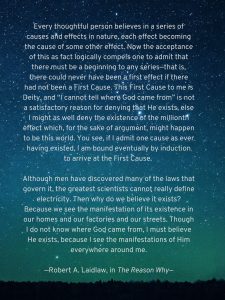
A PDF file of the above graphic is available here.
THIRD — The Bible assumes God’s existence, but it does more. It also points to evidence for His existence.
In Scripture, we don’t see language highlighting with scientific precision the various ways the universe and nature are ordered and obviously the products of a Designer, but we do see poetic affirmations that are entirely compatible with scientific discoveries made about the universe and nature.
“The heavens declare the glory of God,” wrote David in what we now know as Psalm 19, “And the firmament shows His handiwork.
2 Day unto day utters speech,
And night unto night reveals knowledge.
3 There is no speech nor language
Where their voice is not heard.
4 Their line has gone out through all the earth,
And their words to the end of the world (Psalm 19:1-4).
Note verse 3 in particular. Nature and the ordered world speak a universal language, one everyone can understand. They testify clearly to God’s glory.
FOURTH — People are accountable to God.
Nature speaks so clearly about God that God can, and does, rightly hold people to be without excuse for rejecting or ignoring Him. In other words, people are accountable to Him.
Note that in Psalm 14, David wrote,
14:1a The fool has said in his heart,
“There is no God.”
Then, in nearly the rest of the Psalm, he writes about human accountability to the Almighty.
14:1b They are corrupt,
They have done abominable works,
There is none who does good.
2 The Lord looks down from heaven upon the children of men,
To see if there are any who understand, who seek God.
3 They have all turned aside,
They have together become corrupt;
There is none who does good,
No, not one.
4 Have all the workers of iniquity no knowledge,
Who eat up my people as they eat bread,
And do not call on the Lord?
5 There they are in great fear,
For God is with the generation of the righteous.
6 You shame the counsel of the poor,
But the Lord is his refuge.
7 Oh, that the salvation of Israel would come out of Zion!
When the Lord brings back the captivity of His people,
Let Jacob rejoice and Israel be glad.
In the New Testament, Scripture is even more explicit about human accountability to God. In Romans 1:20, Paul wrote that God’s deity and power are clearly evident in creation, so much so that people “are without excuse.” Here is what Romans 1:18-23 says.
18 For the wrath of God is revealed from heaven against all ungodliness and unrighteousness of men, who suppress the truth in unrighteousness, 19 because what may be known of God is manifest in them, for God has shown it to them. 20 For since the creation of the world His invisible attributes are clearly seen, being understood by the things that are made, even His eternal power and Godhead, so that they are without excuse, 21 because, although they knew God, they did not glorify Him as God, nor were thankful, but became futile in their thoughts, and their foolish hearts were darkened. 22 Professing to be wise, they became fools, 23 and changed the glory of the incorruptible God into an image made like corruptible man—and birds and four-footed animals and creeping things (Rom. 1:18-23).
Please note these phrases and clauses. God is revealing His wrath (verse 18) against this backdrop.
-
-
- Verse 19: “what may be known of God is manifest in them”
- Verse 19: “God has shown it to them”
- Verse 20: “clearly seen,” “understood,” “without excuse”
-
Even though people saw and comprehended the truth about God, the passage tells us, “they did not glorify Him as God, nor were thankful, but became futile in their thoughts, and their foolish hearts were darkened” (v. 21). Consequently, “The wrath of God is revealed from heaven against all ungodliness and unrighteousness of men, who suppress the truth in unrighteousness” (v. 18).
God effectively painted a portrait of Himself on the canvas of nature, declaring that He exists and created everything that is. He spoke—and speaks—so clearly that no one can fail to understand. God’s self-portrait is unambiguous. Specifically, since “His eternal power and Godhead” (v. 20) are evident, people know from what they see in nature to look for God, not in nature, but beyond it. Yes, it’s true that we need to know more about God than creation tells us, but here we are concerned with what people have done with the initial information they have received. Many people have ignored and even rejected God’s revelation of Himself.
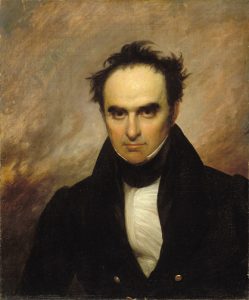
You see, the natural world gives us a window into the unchanging nature of God and therefore the unchanging nature of morality—right and wrong. Truth is like the law of gravity. It is not something that is negotiable, nor is it something that can be invented by each person. Instead, it is observable. It also is discovered, and it applies to everyone at all times and in all places. Adjusting ourselves to accept and conform to the realities we discover paves the way for fulfillment and happiness in life.
It is clear that the Founders of the United States of America “got it”! They affirmed what nature told them about God’s existence and His character.
Daniel Webster (1782-1852) who was born a short time later than the Founders, said, “The most important thought that ever occupied my mind is that of my individual responsibility to God.”
PRINCIPLE TWO
Absolute truths exist and are knowable.
“We hold these truths to be self-evident,” says the Declaration, “that all men are created equal, that they are endowed by their Creator with certain unalienable Rights, that among these are Life, Liberty and the pursuit of Happiness.”
Just what do the signers of the Declaration see as self-evident? Not only that
-
-
- “all men are created equal” and that
- “they are endowed by their Creator with certain unalienable Rights,” but also that
- these truths are inherent, or absolute.
-
I am convinced that to those who hold a Christian or biblical worldview, these truths are indeed self-evident. However, they’re not as readily self-evident to others, to individuals who hold to a secular or a materialistic worldview. Though not all of the Founders were Christians, most were, and the vast majority of them, if not all of them, held to a biblical worldview.
In contrast to the era in which the Founders lived, today many people reject God’s existence, or they have no problem with opting out of a belief that He is real. One of the primary reasons for this is that secularism and materialism have taken hold in society and in people’s minds. When people believe human beings came into being as a result of random forces or chance, God is out of the picture. Without God, man has no accountability and no moral or ethical responsibility; there is no universal, absolute truth. He may as well make up his own truth. Secularists and materialists point to science as a basis for their convictions, but the truth is that secularism is a system of beliefs or faith, just as is biblical Christianity.
Let’s listen in on a conversation between a college freshman and his pastor.
Alan’s Journey
Alan made his way home from college to talk to his pastor about how tough it had been to keep his faith on campus. During his first semester, Alan Wilson experienced an all-out assault on his Christian beliefs. In fact, his faith even was shaken to a certain degree. He wanted to know how he could be certain God is real and the Bible is true.
In particular, Alan saw his fellow students make major decisions on the basis of the assumption that no one ever can know the difference between right and wrong. Right and wrong don’t even exist, Alan! Today everybody makes up his own truth! He’d heard those lines quite a few times, for sure.
Free sex, LGBT pride, abortion, and numerous other attitudes and practices pervaded the culture of the campus. Moreover, a great deal of what Alan heard in the classroom justified this “liberated” approach to life. This included theories of origins that said life on earth came into being as a result of random forces at work over millions of years. As a member of a family who regularly had attended church since before he was born, Alan had been brought up to believe that many of the things he’d seen on campus were immoral and wrong.
Hey, Alan! Come on, man! You’re your own man now! Live it up! Yes, the temptations were strong, but so were Alan’s reservations. If right and wrong don’t exist, Alan wondered, can God really exist? After all, He’s the one who gave us the Ten Commandments!
Alan and his pastor, Matt Thomas, had a long conversation Alan found to be extremely helpful. Among other things, Pastor Matt helped Alan see the big picture on moral truth and right and wrong. Relativism teaches that each individual can make up his or her own truth, but as we soon will see, relativists don’t always practice what they preach.
After Alan told Matt about the pressures he was facing and about the ideas that were assaulting his faith, Pastor Matt responded thoughtfully. He began by advising Alan to make sure that in assessing his situation he didn’t see issues simply in bits and pieces. “In other words,” Matt said, “the conflict you’re experiencing isn’t merely a clash of differing perspectives on a lot of separate things like homosexuality, abortion, premarital sex, cohabitation, or whatever. You’re witnessing a clash of two very different belief systems. Sometimes we call a belief system a worldview. It’s the lens through which a person sees life and reaches conclusions about it. On one side is a worldview that assumes God doesn’t exist, and on the other is the one your upbringing has encouraged you to embrace. That one assumes God is—that He does exist, is personal, and will hold people accountable for how they live.”
Matt continued, “It’s important to remember that a worldview can’t be proved beyond a shadow of a doubt. Worldviews require faith. People may think they are really throwing their weight around when they ask you how anyone can be certain a particular lifestyle choice or action is wrong, but on what authority do they base their conclusion that no one can speak with such certainty? Their belief that that no objective standard of right and wrong exists rests on their assumption that God doesn’t exist—or at least on their adherence to a belief system that assumes God’s nonexistence. Sure, they may say they believe in God, but think about it—the God in which they believe permits people to do whatever they feel like doing. That doesn’t sound like much of a God, does it?” Alan nodded, indicating to Matt that what he was saying made a great deal of sense.
“Alan, here’s the reality,” said Matt. “It is because God exists, and it is because of who He is — His holy character — that absolute truths exist and that He cares about how people live. Notice that in Exodus 20:1-17 where God gave Israel the Ten Commandments through Moses, the very first thing God said was this: “I am the Lord your God, who brought you out of the land of Egypt, out of the house of bondage” (v. 2). So, God’s expectations of people are rooted in His own character! Right is right because it is consistent with God’s character, and wrong is wrong because it conflicts with it.”
Matt also helped Alan understand that claims that evolution is based solely on science are misleading. “Evolutionists may say that natural selection and evolution are pure science and that all objections to them are totally religious and therefore invalid—but many of them cling to their belief in Darwinism with religious fervor. Just as theism is a religious belief, so is atheism.”
Matt went on to point out that those who say they don’t believe in right and wrong actually don’t live that way. They may say absolute truth doesn’t exist, but if someone steals from them, they will be the first ones to appeal to a standard, and on the basis of that standard, object. “All people,” said Matt, “appeal to various values and standards, even if they never realize they are doing so. Innately, each person has a standard of fairness he or she is quick to advocate.”6
A parallel principal applies to those who say they don’t believe in God because of all the evil in the world. Ravi Zacharias observed,
When you say there’s too much evil in this world you assume there’s good. When you assume there’s good, you assume there’s such a thing as a moral law on the basis of which to differentiate between good and evil. But if you assume a moral law, you must posit a moral Law Giver, but that’s Who you’re trying to disprove and not prove. Because if there’s no moral Law Giver, there’s no moral law. If there’s no moral law, there’s no good. If there’s no good, there’s no evil. What is your question?
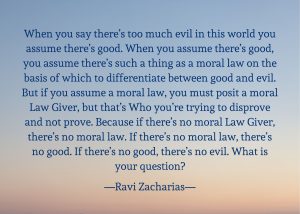
An additional graphic of this quote is available here. A PDF of the above graphic is available here, and an important disclaimer here.
So, we already see some glaring inconsistencies in the secular worldview. All people, even people who claim to be able to make up their own truth, know and even appeal to an external, unchanging standard of right and wrong!
Written on People’s Hearts
There’s more. The following story illustrates how a belief in God and in absolutes makes ordered liberty possible.
A Jewish rabbi bound on a plane for Israel soon discovered he was seated next to one of the leaders of Israel’s socialist labor movement. After the plane became airborne, a student of the rabbi who was seated several rows behind him approached him and offered him his slippers. “Here are your slippers, sir,” he said, “You’ll feel more comfortable in them, since your feet swell terribly on the plane.” A short time later the same young man came forward again and offered the rabbi several sandwiches. “Your wife fixed these for your lunch, sir. We know you’ll like them much better than the food the airline will offer.”
These were not isolated incidents, but a pattern; the student returned on numerous occasions to check on the rabbi, to offer him something to make his flight more pleasant, or to serve him in some other way. All of this made quite an impression on the socialist leader, who finally turned to his seatmate and said, “Wow! I’m so impressed with your son! I have four grown sons, and never in all my life have they offered to serve me as your son has waited on you. Why is he so attentive to you?”
“I have to be honest with you,” said the rabbi. “This young man is not my son but my student. His service, as good as it is, is nothing compared to the assistance my own son would give me if he were here.
“The reason the members of the next generation, including members of our own families, treat us as they do is quite simple. All of them are living according to the ideas and principles we’ve taught them. You decided some time ago to tell them that you—and they—descended from apes, and this is what you taught them. They know intuitively this means that you are one generation closer to being a monkey than they are, so it’s only natural that they would expect you to serve them. I, on the other hand, have taught my children and students that we have been created by God Himself. They understand this puts me one generation closer to the Source of Ultimate Truth, and they treat me in accord with this understanding. We reap what we sow.”7
Of course, just as the socialist leader’s belief in evolution does not prove God doesn’t exist, neither does the rabbi’s belief in divine creation prove that He does. Yet our story does emphasize some very important realities.
-
-
- First, note carefully that the rabbi’s seatmate noticed the service the rabbi was receiving as respectful treatment. Yet his worldview really didn’t allow him to recognize this. Apart from God, there is no right and wrong, good or evil. As Josh McDowell has stated, logically applied, a relativistic worldview sees no difference between the wheat fields of Kansas and the ovens at Auschwitz. Yet people who claim to be atheists and relativists recognize right and wrong, and thus absolute truths, all the time! These are self-evident to them when it is convenient and when it serves their purposes. I am not saying they are being malicious in doing this, but merely pointing out that these actions demonstrate that the realizations are innate in all people.
- A belief in having been created by God is conducive to civil behavior, and ultimately to a civil society. It also sets the stage for us to see that true freedom can exist only in a society grounded in virtue. Without virtue, freedom unravels into chaos, which leads to bigger government and, finally, to tyranny.
-
Consider the positive virtues inherent in the rabbi’s perspective. A belief in being created by God helps a person to cultivate a variety of noble qualities in his or her life, including these.
-
-
-
- Generosity
- Gratitude
- Selflessness
- Humility
- A sense of responsibility
- A sense of accountability
- Respect for others
- Respect for one’s elders
- Respect for one’s peers, grounded in the truth that all of human life is valuable because God creates it in His image (something we will explore in a future study)
-
-
And to think—we got all this just from considering the implications of the rabbi’s observations on the plane!
Yes, People intuitively know right from wrong, as we’ve already observed. And they know it thoroughly enough to be “without excuse” (Rom. 1:20). Hear carefully what Paul wrote in Romans 2:12-16 (NIV; note the added emphasis):
12 All who sin apart from the law will also perish apart from the law, and all who sin under the law will be judged by the law. 13 For it is not those who hear the law who are righteous in God’s sight, but it is those who obey the law who will be declared righteous. 14 (Indeed, when Gentiles, who do not have the law, do by nature things required by the law, they are a law for themselves, even though they do not have the law. 15 They show that the requirements of the law are written on their hearts, their consciences also bearing witness, and their thoughts sometimes accusing them and at other times even defending them.) 16 This will take place on the day when God judges people’s secrets through Jesus Christ, as my gospel declares.
Let’s hear from a couple of America’s early leaders.
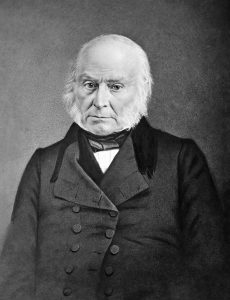
John Quincy Adams served as the sixth president of the United States. He said, “There are three points of doctrine the belief of which forms the foundation of all morality. The first is the existence of God; the second is the immortality of the human soul; and the third is a future state of rewards and punishments. Suppose it possible for a man to disbelieve either of these three articles of faith and that man will have no conscience, he will have no other law than that of the tiger or the shark. The laws of man may bind him in chains or may put him to death, but they never can make him wise, virtuous, or happy.”
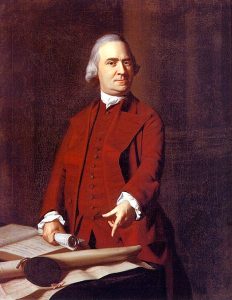
Founding Father Samuel Adams declared, “[N]either the wisest constitution nor the wisest laws will secure the liberty and happiness of a people whose manners are universally corrupt. Here therefore is the truest friend to the liberty of his country who tries most to promote its virtue, and who, so far as his power and influence extend, will not suffer a man to be chosen into any office of power and trust who is not a wise and virtuous man.”
 Let’s Review
Let’s Review
Here are the tenets we are highlighting during this initial session.
-
-
- God exists, has established an ordered and moral universe, and holds humanity accountable.
- Absolute truths exist and are knowable.
-
Thank you for leading your group! Have a great Bible study session!
A teaching plan for Session 1 is available here.
Copyright © 2020 by B. Nathaniel Sullivan. All rights reserved.
Unless otherwise indicated, Scripture has been taken from the New King James Version®. Copyright © 1982 by Thomas Nelson, Inc. Used by permission. All rights reserved.
The Scripture reference marked NIV has been taken from The Holy Bible, New International Version®, NIV® Copyright © 1973, 1978, 1984, 2011 by Biblica, Inc.® Used by permission. All rights reserved worldwide.
Notes:
1Stephen Puleo, American Treasures, (New York: St. Martin’s Press, 2016), 52.
2Lee Strobel, The Case for a Creator, (Grand Rapids: Zondervan, 2004), 128.
3http://www.messiah.edu/homepage/1662/robin_collins
4Strobel, 131.
5http://www.godandscience.org/apologetics/designss.html
6adapted from Adult Leader Guide, KJV Family Bible Study, Spring 2005, (Nashville: LifeWay Christian Resources, 2004), 125-126.
7Rabbi Daniel Lapin, America’s Real War: An Orthodox Rabbi Insists that Judeo-Christian Values Are Vital for Our Nation’s Survival, (Sisters, OR: Multnomah Publishers, 1999), 51-52.
top image: The Declaration of Independence of the United States of America by Armand-Dumaresq / 1873
